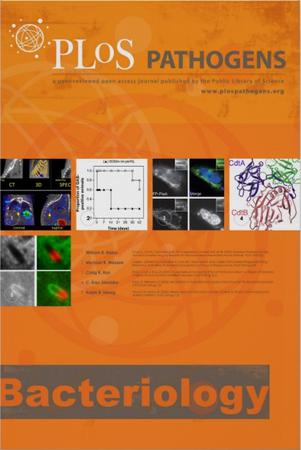对多个解剖部位的 SIV 特异性 CD8+ T 细胞进行多组学分析
IF 4.9
1区 医学
Q1 Immunology and Microbiology
引用次数: 0
摘要
CD8+ T细胞对免疫缺陷慢病毒产生免疫压力。在之前的研究中,我们研究了在整个 SIV 感染过程中或接种疫苗后,CD8+ T 细胞对单一 SIV 免疫优势表位(Gag-CM9)特异性的 TCR 反应谱,以及跨多个解剖部位的 TCR 反应谱。我们发现了组织特异性 TCR 序列和多个解剖部位共有的 TCR。在此,我们使用单细胞 RNA 测序来评估 CM9 特异性 CD8+ T 细胞的组织定位或 TCR 序列是否与独特的转录组学相对应。我们从SIV感染猕猴的血液、淋巴结、脾脏和肝脏中分拣出了CM9特异性CD8+ T细胞,这些猕猴患有进行性SIV感染,而且在停止抗逆转录病毒治疗后自发控制了SIV复制。这些细胞通过单细胞测序方案进行处理,建立了与单个细胞相对应的 TCR 扩增文库和 RNA 基因表达文库。基因组富集分析显示,CM9 特异性 CD8+ T 细胞在不同解剖部位之间、具有共享或组织特异性 TCR 的细胞之间没有明显的转录特征。同样,动物个体间共享的克隆型也没有明显的转录特征。不过,与渐进感染的动物相比,治疗后控制者的 CM9 特异性 CD8+ T 细胞确实表现出与细胞活化相关的通路富集,这表明抗原特异性 CD8+ T 细胞中不同细胞通路的转录改变可能与病毒控制有关。总之,这些研究全面分析了解剖和克隆起源与抗原特异性 CD8+ T 细胞转录特征之间的关系,并揭示了可能对 CD8+ T 细胞介导的 SIV 复制控制很重要的途径。本文章由计算机程序翻译,如有差异,请以英文原文为准。
Multi-omics analysis of SIV-specific CD8+ T cells in multiple anatomical sites
CD8+ T cells exert immunological pressure against immunodeficiency lentiviruses. In previous studies, we examined the TCR repertoire of CD8+ T cells specific for a single SIV immunodominant epitope, Gag-CM9, throughout SIV infection or after vaccination, and across multiple anatomic sites. We identified both tissue specific TCR sequences and TCRs shared by multiple anatomical sites. Here we use single cell RNA sequencing to evaluate if the tissue localization or TCR sequence of a CM9-specific CD8+ T cell corresponds with unique transcriptomics. CM9-specific CD8+ T cells were sorted from blood, lymph nodes, spleen, and liver from SIV infected rhesus macaques with progressive SIV infection and in animals who spontaneously control SIV replication after cessation of antiretroviral therapy. The cells were processed through a single cell sequencing protocol, creating a TCR amplified library and an RNA gene expression library corresponding to individual cells. Gene set enrichment analysis revealed no distinct transcriptional profiles for CM9 specific CD8+ T cells between different anatomical sites and between cells with shared or tissue specific TCRs. Similarly, no clear transcriptional profiles were associated with clonotypes which were shared across individual animals. However, CM9 specific CD8+ T cells from posttreatment controllers did exhibit enrichment of pathways associated with cellular activation compared to progressively infected animals, suggesting that altered transcription in distinct cellular pathways in antigen specific CD8+ T cells may associate with viral control. Together, these studies represent a thorough analysis of the relationship between anatomical and clonal origin, and the transcriptional profile of antigen specific CD8+ T cells and unravel pathways that may be important for CD8+ T cell mediated control of SIV replication.
求助全文
通过发布文献求助,成功后即可免费获取论文全文。
去求助
来源期刊

PLoS Pathogens
生物-病毒学
CiteScore
11.40
自引率
3.00%
发文量
598
审稿时长
2 months
期刊介绍:
Bacteria, fungi, parasites, prions and viruses cause a plethora of diseases that have important medical, agricultural, and economic consequences. Moreover, the study of microbes continues to provide novel insights into such fundamental processes as the molecular basis of cellular and organismal function.
 求助内容:
求助内容: 应助结果提醒方式:
应助结果提醒方式:


